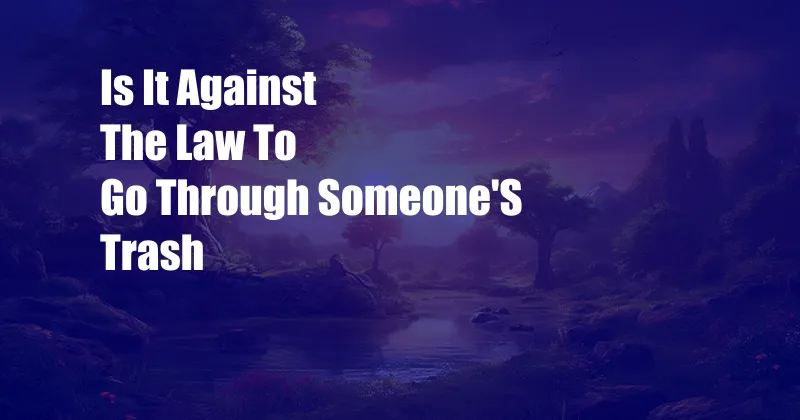
Is It Against the Law to Go Through Someone’s Trash?
Imagine coming home from work exhausted, only to find your neighbor rummaging through your trash bags strewn across your driveway. Your heart skips a beat as you wonder if they’re looking for something incriminating or just trying to be nosy. In that moment, a question crosses your mind: is it even legal for them to do this?
The answer to this perplexing question is both fascinating and nuanced. While there is no federal law explicitly prohibiting the act of going through someone’s trash, the legality varies widely depending on the specific circumstances and state laws.
Trespassing and the Fourth Amendment
The Fourth Amendment of the U.S. Constitution protects individuals against unreasonable searches and seizures by the government. However, this protection does not extend to private individuals or private property. Therefore, if you go through someone’s trash while trespassing on their property, you may be guilty of trespassing, a misdemeanor or felony offense depending on the state.
So, what constitutes trespassing? Generally, trespassing occurs when you enter or remain on someone else’s property without their permission. In most cases, placing trash cans or bags on the curb or driveway does not constitute an invitation to enter the property, as trash is considered discarded or abandoned property.
What if the Trash is on Public Property?
The legality of going through someone’s trash becomes more complicated when the trash is placed on public property, such as a sidewalk or curbside. In these instances, the Fourth Amendment protection against unreasonable searches and seizures does apply. However, the courts have ruled that there is a diminished expectation of privacy in discarded property.
This means that while going through someone’s trash on public property is not necessarily illegal, it could be considered an invasion of privacy. Some states have passed laws specifically prohibiting the unauthorized removal or examination of discarded property, while others consider it a lesser offense.
Legal Consequences of Going Through Someone’s Trash
The consequences for going through someone’s trash vary depending on the circumstances and the state laws. In most cases, you will not be charged with a felony unless you enter someone’s property or home to access the trash.
However, even if you do not trespass, you could still face misdemeanor charges, fines, and civil penalties for violating privacy laws or causing distress to the homeowner. Additionally, if you find and use information from the trash to commit other crimes, such as identity theft or extortion, you could face additional charges.
Expert Advice for Avoiding Legal Issues
To avoid any legal complications, it’s best to err on the side of caution and refrain from going through someone’s trash. If you have a legitimate reason to access someone’s trash, such as for lost property or public health concerns, always obtain permission first.
If you find yourself in a situation where someone is going through your trash, remain calm and do not confront them directly. Instead, contact the police or code enforcement to report the incident.
FAQ on Going Through Someone’s Trash
Q: Can I go through someone’s trash if it’s on my property?
A: Yes, but only if you have their permission or if the trash is clearly visible from a public area.
Q: What are the consequences for going through someone’s trash on public property?
A: It depends on the state laws and could range from a civil infraction to a misdemeanor charge.
Q: Can I face any charges if I find incriminating evidence in someone’s trash?
A: Yes, you could face additional charges if you use the information to commit other crimes, such as blackmail or identity theft.
Conclusion
The legality of going through someone’s trash is a complex and nuanced issue that depends on the specific circumstances, state laws, and individual privacy rights. While it may not always be illegal, it’s highly discouraged due to potential legal consequences and ethical concerns.
So, next time you spot someone digging through your trash, remember the golden rule: don’t do unto others what you would not have them do unto you. Let’s all strive to respect each other’s privacy and keep our trash where it belongs—in the trash bin.
Are you interested in learning more about legal issues related to trash and privacy? Share your questions or thoughts in the comments section.